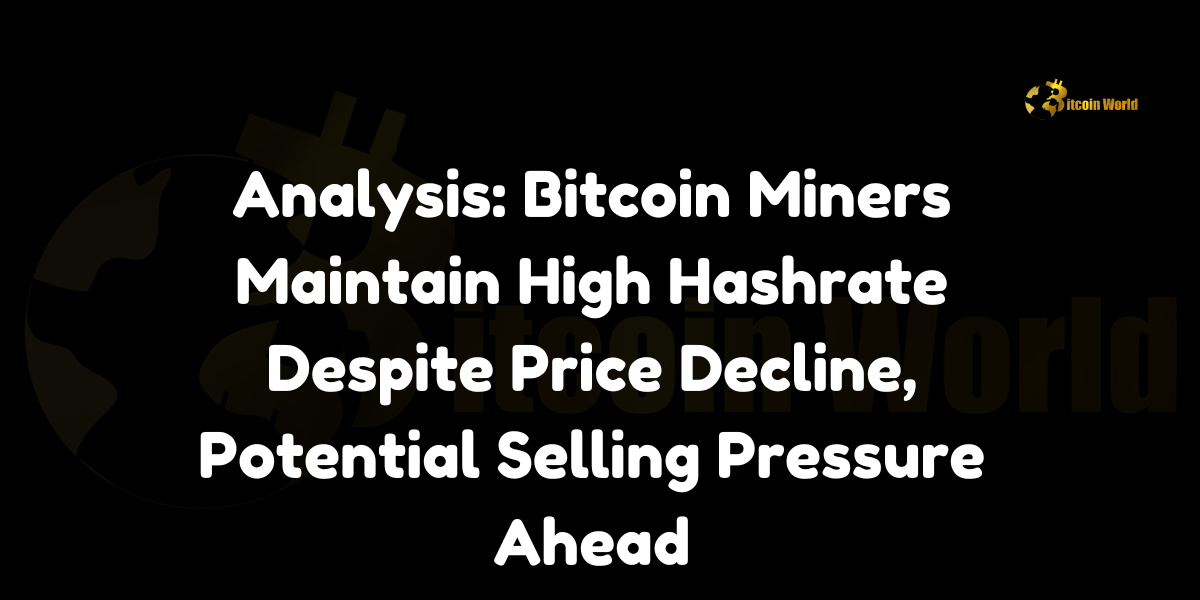Despite the recent decline in Bitcoin’s price and reduced profitability, Bitcoin miners continue to maintain a high hashrate, signaling confidence in the network. According to a report from Glassnode, a leading on-chain data analysis firm, miners have not reduced their hashrate, which recently hit a record high of 740 EH/s on September 3. The current hashrate, as per data from BTC.com, stands at 673.29 EH/s, underscoring miners’ ongoing commitment to network security despite the market’s bearish conditions.
However, Glassnode’s report also highlights the potential for increased selling pressure from miners if Bitcoin’s price weakness persists. In bear markets, miners typically shift from holding their Bitcoin to selling it in order to cover operational costs. As market conditions continue to fluctuate, the firm warns that miners may begin to sell off their holdings, which could add downward pressure on Bitcoin’s price.
Miners’ Confidence in the Bitcoin Network
The sustained high hashrate indicates that miners are displaying tremendous confidence in the Bitcoin network, even as profitability decreases due to falling prices. A high hashrate is crucial for securing the Bitcoin blockchain, as it reflects the total computing power being used by miners to validate transactions and protect the network from attacks.
The recent record high of 740 EH/s highlights the resilience of Bitcoin’s mining sector. Despite the challenges posed by reduced profits, miners continue to allocate significant resources to maintain network security. This suggests that many miners have confidence in Bitcoin’s long-term potential and are willing to absorb short-term losses in the expectation of future price recoveries.
Potential Selling Pressure from Miners
However, the report cautions that miners could begin to sell their Bitcoin if the market continues to decline. In bull markets, miners tend to hold onto their Bitcoin, as rising prices offer higher profitability. In contrast, during bear markets, miners often face the need to sell portions of their holdings to cover the costs of mining operations, such as electricity and hardware maintenance.
With Bitcoin prices under pressure and profitability declining, the likelihood of miner sell-offs increases. Glassnode’s analysis suggests that if the market remains weak, miners may begin selling Bitcoin to sustain their operations, potentially leading to further downward pressure on the price.
Decreasing Network Activity and Investor Sentiment
In addition to the potential selling pressure from miners, Glassnode also pointed out that network activity between exchanges and investors has been decreasing. This decline suggests that investors’ willingness to trade Bitcoin is waning, a sign that market sentiment may be weakening further.
The net outflow from both Bitcoin and Ethereum (ETH) spot ETFs also supports this view. As investor interest in trading diminishes, the outflows from ETFs indicate that traders are becoming more risk-averse, reducing their exposure to volatile assets like Bitcoin and Ethereum.
A reduction in trading activity is often a sign of uncertainty or a lack of conviction in the market’s near-term direction. With fewer participants actively trading, liquidity decreases, potentially exacerbating price fluctuations. The combination of falling trading volumes and potential sell-offs from miners could create additional challenges for Bitcoin’s price stability in the coming months.
What’s Next for Bitcoin Miners and the Market?
As the Bitcoin network hashrate remains elevated, miners continue to show their belief in the long-term prospects of the network. However, the market’s current weakness could push some miners to sell off their Bitcoin reserves if the price does not recover soon.
While the record-high hashrate signals strong network security, it may also indicate that many miners are operating at thin margins, meaning that any further decline in Bitcoin’s price could force them to sell their holdings. If this selling pressure materializes, it could contribute to further price declines.
Additionally, the decrease in network activity and investor trading, combined with outflows from Bitcoin and Ethereum spot ETFs, points to weakening market sentiment. These factors could weigh on Bitcoin’s price in the near term, particularly if macroeconomic conditions remain uncertain and investors continue to seek safer assets.
Conclusion: Miners Hold Steady, But Risks of Selling Pressure Remain
Bitcoin miners are maintaining a high hashrate despite declining profitability, signaling confidence in the network’s long-term potential. However, Glassnode warns that if the market weakness continues, miners may be forced to sell off their Bitcoin, potentially adding downward pressure to the market. With network activity and investor trading volumes decreasing, the combination of miner sell-offs and reduced market participation could lead to increased volatility for Bitcoin in the coming months.
To learn more about the innovative startups shaping the future of the crypto industry, explore our article on latest news, where we delve into the most promising ventures and their potential to disrupt traditional industries.





